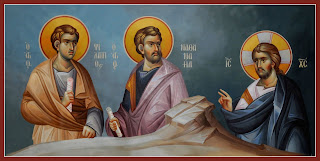The
Revised common Lectionary’s suggested gospel reading for this week is Luke 10:1-11,
16-20. It is Luke’s version of the Commissioning
of the Seventy. A portion of the reading reads:
Go
on your way. See, I am sending you out like lambs into the midst of wolves.
Carry no purse, no bag, no sandals; and greet no one on the road. Whatever
house you enter, first say, “Peace to this house!” And if anyone is there who
shares in peace, your peace will rest on that person; but if not, it will
return to you. Remain in the same house, eating and drinking whatever they
provide, for the labourer deserves to be paid. Do not move about from house to
house. Whenever you enter a town and its people welcome you, eat what is set
before you; cure the sick who are there, and say to them, “The kingdom of God
has come near to you.” But whenever you enter a town and they do not welcome
you, go out into its streets and say, “Even the dust of your town that clings
to our feet, we wipe off in protest against you. Yet know this: the kingdom of
God has come near.”
-- Luke 10:3-11
This is
certainly an example of the austerity that Jesus asked of his disciples (and we
remind ourselves that this is not just an undertaking by The Twelve, but a much
larger endeavor by seventy disciples).
It also speaks of the faith that Jesus asks of his emissaries that God
will provide for their needs. These are
good words.
There is,
however, another possible way of looking at the passage. We remember that, while Jesus died around 35 CE,
the gospel of Luke was not put to paper until around 75 CE, a bit after the
fall of Jerusalem in 72 CE. In the forty
years between Jesus’ ministry and the composition of the Third Gospel the
church dealt with a number of difficulties within its membership. One of those was the abuse of hospitality or
generosity by would-be evangelists. Luke
10 has the ring of a document that has gathered some material in order to
address a more recent situation. That is
to say that it is possible that Jesus gave a piece of instruction here and
another there which Luke has gathered into one place for emphasis and instruction.
We notice
that there is a marked similarity between this teaching and the first-century
document that didn’t make the final cut for inclusion in the Bible: The
Dicache (“The Teaching of The Twelve”).
There is a section of that work that reads:
Chapter
11. Concerning Teachers, Apostles, and Prophets
Whosoever,
therefore, comes and teaches you all these things that have been said before,
receive him. But if the teacher himself turn and teach another doctrine to the
destruction of this, hear him not; but if he teach so as to increase
righteousness and the knowledge of the Lord, receive him as the Lord. But
concerning the apostles and prophets, according to the decree of the Gospel,
thus do. Let every apostle that comes to you be received as the Lord. But he
shall not remain except one day; but if there be need, also the next; but if he
remain three days, he is a false prophet. And when the apostle goes away, let
him take nothing but bread until he lodges; but if he ask money, he is a false
prophet. And every prophet that speaks in the Spirit you shall neither try nor
judge; for every sin shall be forgiven, but this sin shall not be forgiven. But
not every one that speaks in the Spirit is a prophet; but only if he hold the
ways of the Lord. Therefore from their ways shall the false prophet and the
prophet be known. And every prophet who orders a meal in the Spirit eats not
from it, except indeed he be a false prophet; and every prophet who teaches the
truth, if he do not what he teaches, is a false prophet. And every prophet,
proved true, working unto the mystery of the Church in the world, yet not
teaching others to do what he himself does, shall not be judged among you, for
with God he has his judgment; for so did also the ancient prophets. But whoever
says in the Spirit, Give me money, or something else, you shall not listen to
him; but if he says to you to give for others' sake who are in need, let no one
judge him.
False
prophets and money-grubbing wolves in sheep’s clothing did not cease appearing
with the closing of the New Testament.
Anyone with a television who turns the set on during weekend evenings
can see these a-plenty. You’d think we
would have caught up with them by now.


